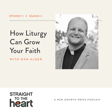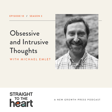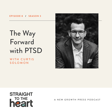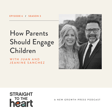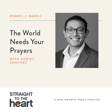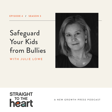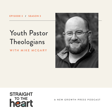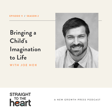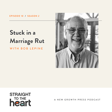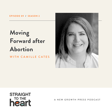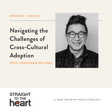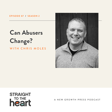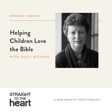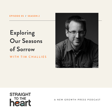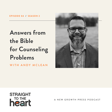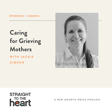Understanding Biblical Self-Care
00:00:00
Speaker
Biblical self-care is really not just a one-size-fits-all. It's really looking at who you are, how God has created you, what limitations do you have, what gifts do you have, what strengths do you have, and how do you steward those things for the glory of God.
00:00:17
Speaker
I'm Rush Witt and you're listening to Straight to the Heart, a podcast from New Growth Press. Each episode includes thought-provoking conversations with leading Christian writers and thinkers. We hear who they are, what they believe, how they approach their work in ministry, and the moments in people who have changed their lives.
00:00:35
Speaker
In Straight to the Heart, we go beyond the books to connect with the remarkable people behind them.
Meet Eliza Huey
00:00:41
Speaker
In this episode of Straight to the Heart, my guest is Eliza Huey, director of counseling at McLean Bible Church in Vienna, Virginia. She's the author of several books, including I'm Stressed, Raising Emotionally Healthy Kids, the mini-book Teens and Anxiety, and she's the co-author of The Whole Life and The World Rejoices.
00:01:01
Speaker
Eliza and her husband Ken have three grown children, two daughters-in-law, and a sweet grandson. In our conversation, Eliza's passion shines through, a passion for providing gospel-centered holistic care and resources to individuals and families.
Avoiding Burnout in Families
00:01:18
Speaker
And as the title suggests, I hope this episode helps you avoid burnout for you and your family. This is Straight to the Heart.
00:01:29
Speaker
So what's going on in life and ministry these days? Wow. Yeah, that's a big question. In life, I am probably the most exciting thing that I would love to share is that I am venturing into a new world of becoming a grandmother. So I know we have three children.
00:01:52
Speaker
And our oldest and our youngest are married. The one in the middle is not, but the oldest and youngest are married. And the oldest is going to be having their first child. My son and my daughter-in-law will be having their first child. And so I'm so excited. Congratulations. Yeah, it's been really, really like something I didn't expect to become so interested in babies once again. I mean, when we were having babies, that was like, you know, I was looking at all the baby things and now I'm doing that again. So it's really fun.
00:02:22
Speaker
When is the baby due? In January of 2024. So I don't know when this is going to be shared, but pretty soon. Pretty soon. That's great. That's very exciting. And what's going on in ministry?
The Ministry Role and Counseling Demands
00:02:35
Speaker
So yeah, ministry is busy, as probably most people in ministry would say. There's always things that are happening. So I serve at McLean Bible Church in the DC Metro area. And if you know of the church, it's a big church. So there's lots of ministry needs.
00:02:54
Speaker
But my specific area is in counseling, so I'm the director of counseling there. And certainly, I would say we are always looking for ways to better care for people. But one of the things that I also get the privilege of doing is having the opportunity to equip
00:03:11
Speaker
people to care. And so we're about to launch one of the classes that we do. It's a very intensive class. It's with the Association of Biblical Counselors, and we take people through a late counseling class. And so that's about to launch. We'll have a lot of
00:03:26
Speaker
my colleagues joining me for lectures and so the students always enjoy that but my joy is just to be able to see people serving in the church in a way where they're gifted and where they feel like they are able to touch people's needs and so forth and so it's really exciting to see the
00:03:44
Speaker
the congregants really take off and learn a lot about themselves and about others as they walk through how to become a lay counselor. So that's pretty exciting as well. So lots going on besides that as well. But those are those are two things that are kind of in the forefront of my mind these days.
00:04:00
Speaker
That is exciting. And I think it's really important because, you know, in churches, as you know, there are so many counseling issues and needs that it's not even possible to have enough church leadership, staff, pastors, et cetera, to handle all of that. And so in a healthy church situation, there have to be
00:04:20
Speaker
the congregation has to be able to care for each other in these ways. And so I think that's a really important and helpful thing.
Eliza's Counseling Journey
00:04:30
Speaker
So I remember when your book with Esther Smith, The Whole Life came out. It was a really helpful resource for Christians.
00:04:36
Speaker
in particular, to strike a balance between just the many areas of life and busyness. And I'm curious what gave you an interest in the topic of self-care and for that matter counseling, because you're obviously involved in counseling and counseling training. How did that become a part of your life? Yeah, so I'll start with the first question, how I became a counselor, how counseling became a part of my life.
00:05:05
Speaker
And it's a story, I think, that is common to a lot of people. As one who trains counselors, I see this as being a common story. So it's not all that unique, but really my own need for counseling and seeing that it was difficult. I couldn't find it in my own church, and that was not anything against my church. In fact, my pastor gave me some great recommendations, but there really wasn't anything in the church.
00:05:27
Speaker
And I think that's a lot of people's story is oftentimes they feel like what I need is a little bit more than just a visit with my pastor. Not that that's, I mean, that's always helpful and always necessary, but just a little bit more where I'm going to need some more long-term investment and so forth. And so my pastor recommended CCEF. And so I ended up, it was too far away.
00:05:51
Speaker
but was able to get a referral from them and just working with a counselor and finding that such a good, helpful thing. We were in the midst of a lot of transition, a lot of
00:06:00
Speaker
difficult seasons in our life and I didn't really have any friends nearby because we had just moved to the area and then my husband underwent a job loss. I mean, there's just so many things coming at us at once that it was helpful to have somebody who would walk with me and listen to me process, but also continually remind me of the truth of who God is in the midst of all the instability that was happening around me, that solid anchor. And my heart was really like,
00:06:28
Speaker
helped by that. And obviously, you know, my my other ways I was helped by that I was able to kind of move into my church in a
00:06:36
Speaker
in a different way, having processed some of my own struggles. But I realized that would be so great if the church was equipped. And interestingly enough, the part that maybe is a little different is that my counselor was the one who said, you should really consider getting trained in this. I met with him for a little while, and we were pretty much wrapping up. And so he sent me, actually, to a CCEF.
00:07:00
Speaker
conference in Philadelphia at the time. And for those of you who don't know, I'm thinking everybody knows about the Christian Counseling Educational Foundation.
00:07:08
Speaker
And it was fantastic, and that really was the beginning of my journey in counseling. I went through every class that they had at the time, and that took a long time because my kids were still at home and kind of in the middle school, high school years, so they were a little less needy in the sense of little kids, but they were busy, and so it took a little while.
00:07:31
Speaker
And then after that, I started serving in a ministry and then very quickly began to, actually with the help of the board, kind of realized it might be good to get more formal training. So I went back to school, got a degree in counseling at a seminary in Pennsylvania as well.
Collaborative Writing on 'The Whole Life'
00:07:52
Speaker
And that was sort of my entry in. And so I haven't looked back ever since.
00:07:57
Speaker
So that's kind of the counseling side of it. And that is actually where I met Esther. So long story short, I worked there for quite a while about, I can't remember, I think it was like 11 years. I worked at this Counseling Ministry Life Counseling Center in Maryland and
00:08:12
Speaker
Esther worked for me. I ended up becoming the director of counseling there and she worked for me and I just appreciated her. Her and I were very different. I'm kind of a, anytime I see an idea or hear an idea, I'm kind of like, yes, let's do it. And she's a little bit more like, let's think about it and let's consider, you know, and so for us to be able to work together is a unique circumstance because
00:08:37
Speaker
She was definitely kind of more slow with being thoughtful about things and I was a little bit more like, here's an idea and I've got it sketched out and let's start it tomorrow. But I think it really brought a balance to the whole life because she has certain circumstances in her own life that cause her to have some limitations
00:08:57
Speaker
in her health. And, you know, if I wrote the whole life by myself, I think people would be exhausted by reading it. So she brought that balance. And my goodness, I've written quite a bit since then. And that probably was one of the best writing experiences I've ever had was writing with her. So yeah, it was a joy. And the idea just really developed better because she was a part of it as well.
Pacing Life and Self-Care Practices
00:09:22
Speaker
It's so interesting that you talk about the process of the book being written in that way between the two of you because it's a lot about pace and the difference of pace maybe between the two of you and the way you complimented each other. But what's interesting is the way that that actually is at the center of what you write about in the whole life is finding the pace of life that is suitable for the long run.
00:09:45
Speaker
So with that in the whole life, I think the analogy that you use of a long distance runner is a really helpful picture because runners can't sprint that long distance, but have to find the suitable pace for the long haul. And so I just wonder in the course of writing and thinking about your own life, why do you think so many of us struggle to find that pace?
00:10:07
Speaker
I would say what I have come to experience both in the counseling room and even in my own life is that we live in a world that values productivity, performance, and so if you are doing something or if you are producing something, then there's more value attributed to.
00:10:27
Speaker
Uh, you know you if you will though, we know that's not true. That's the world we live in and so it can push us to Take on more to push harder to run longer to run faster to run harder to carry a whole lot while we're running all of those sprints And the slower pace is also difficult because it allows room you as you slow down you naturally create space
00:10:53
Speaker
to actually consider things that when you're running so fast, you don't have time to think about. And that can actually be a way of coping. We can cope by taking on so much that we don't have time to think about what's really important, what are some of the things we're struggling with, what are some of the things we really deeply, we feel deeply about. And so I would say it has a lot to do with the fact that
00:11:18
Speaker
the world, the culture we live in, but also just the things that we maybe don't want to really slow down and process and think about. But that's the reality. The scripture calls us to be still and know
00:11:33
Speaker
that He is God. We are not. And so, yeah, I think it can be a challenge for anyone, really. Even in the going slow, you can have certain challenges as well, and that's what you'll see in the book. Biblical self-care is really not just a one-size-fits-all. It's really looking at who you are, how God has created you, what limitations do you have, what gifts do you have, what strengths do you have.
00:11:57
Speaker
And how do you steward those things for the glory of God? So stewarding them is going to look different in you, Rush, as it would in me. And so we want to be able to see that. And that's like you already alluded to, the fact that Esther and I wrote this together, really, it is a much better picture of biblical self-care because of that.
00:12:21
Speaker
And I do think that everybody will find their own challenges, whether it's going too fast or maybe avoiding certain things as well and just not going at all.
00:12:31
Speaker
I think that you and I have that in common that I'm like you just described in the sense that I like to kind of chase after opportunities or when there's some opportunity for ministry to kind of go after it. And it can create that kind of really, really kind of heavy pace and that can be exhilarating, but it can also be kind of detrimental. So I'm curious in your life with respect to that, what are some keys specific to you that you found helpful in finding your pace?
00:13:01
Speaker
Sure. If anybody follows me on social media, they'll probably know this is very true. I have to get outside. And so I do a lot of hiking, a lot of just even walking, walking in my neighborhood or walking in the woods. That's where I pray. It's where I can kind of let go and not chase after things so much. And so that's kind of my go to like relaxation.
00:13:31
Speaker
hobby or exercise, whatever that is. And it doesn't have to even be anything. It can be a 30-minute walk or hike or something like that. So that's something that I do physically. But also, relationally, I'm definitely a more social person, so I get life. My life is energized by being with people.
00:13:51
Speaker
So spending time with family and friends is also something that I have to prioritize because our schedules get so busy that those things can all of a sudden you realize like I haven't my kids are all grown. I haven't seen my grown kids in a while or haven't talked to this friend. And so trying to be more intentional about that but also spiritually for me I
00:14:13
Speaker
practice daily disciplines of just reading the word prayer and they can sometimes feel like just a routine but those routines that are so regular they create this rhythm that when you think about rhythm i think about the thing that comes to my mind is a heartbeat and that's like that gives you life you know those rhythms actually
00:14:36
Speaker
kind of keep your heart going, your spiritual heart going. And so those are just some things that I try to prioritize.
The Essence of Self-Care
00:14:46
Speaker
Eliza Huey has co-authored with Esther Smith, a book called The Whole Life, 52 Weeks of Biblical Self Care. In it, they outline a balanced life of stewardship, offering practical strategies for Christians to grow in honoring God and caring for others.
00:15:03
Speaker
Eliza and Esther focus on six key areas, faith, health, purpose, community, work, and rest. Each chapter addresses a specific topic and guides readers in thinking biblically about their whole life.
00:15:18
Speaker
Breaking down the misconceptions that self-care is not biblical, the whole life reveals that caring for yourself doesn't mean you're being selfish or lazy. Instead, it's a way of stewarding every part of your life for God's glory and the good of others.
00:15:34
Speaker
This book will reorient you to the core value of resting your heart, your mind, and strength in Christ. You can learn more about the whole life 52 weeks of biblical self-care by Eliza Huey and Esther Smith when you visit NewGrowthPress.com.
00:15:59
Speaker
I think that some Christians hear that language of self-care, and they think that it sounds selfish to think that way. You know, because there is that sense that we should really be pouring ourselves out. But it's not really selfish to consider how we care for ourselves and what kind of pace we should be running in life, right?
00:16:22
Speaker
Right. Yeah. And that's where we have to look at it as a form of stewardship because when we think about, so maybe you spend, I don't know, a large chunk of money to buy a vehicle, especially right now, it seems like vehicles are very expensive. You spend a good amount of money to buy a vehicle. How
00:16:43
Speaker
How wise would it be just to drive that vehicle and never really think about, beyond just the gas that you have to put in it, never really think about any of the upkeep and care. You're driving it a long way. You're driving it hard. The tread's getting thin on the tires. The oil may be needing to be changed by a few months overdue or something like that. We would never think, well, you're so selfish to only think about putting money or investment or time into your car. No, we'd say that's why stewardship.
00:17:12
Speaker
It's really interesting how we don't think about that with our bodies especially, and there's a big portion of the book that we do talk about our bodies, and that's, I would say, an area that we have missed as Christians, really being able to look at what it means to be embodied, to look at what it means to steward what we have been given.
00:17:35
Speaker
in our bodies whether that means just the regular needs of food and sleep or maybe the recognition of, you know what, this overwhelms me or this stresses me out and so I need to do something to counter that and sometimes that's physical whether that's taking a deep breath.
00:17:53
Speaker
or going for a walk, or giving yourself some space, stepping away from something, you're actually stewarding yourself. And that's not selfish. It's actually wisdom. And it's allowing you to be able to move into those situations with greater ability to engage. So, yeah.
00:18:13
Speaker
Yeah, I think so too. And that's a hard truth to embrace for many of us for the reasons that you've given earlier that we're living in a culture that really prioritizes pace, speed, productivity, value. And so it really is a
Emotional Support for Children
00:18:28
Speaker
I know you also counsel and encourage parents who want to encourage their kids in these ways because our kids are living in the same culture and it seems to even be just ramping up the speed for them. And so as you do that, what are some of those keys that parents can use to build good routines or maybe even margin into the habits of their own family life or the lives of their kids?
00:18:53
Speaker
Yeah, so I think a lot of parents are feeling this and all the more so as kids become more aware of mental health, that's something that is very, very much a newer thing. It wasn't around when I was a child. We were not talking about anxiety and depression in middle school.
00:19:11
Speaker
But all parents are facing this and kids are very aware of the various mental health type conversations. But beyond that, they're also facing pressures like we never knew. I really believe that to be true and not to be an exaggeration that kids face.
00:19:29
Speaker
unique pressures that we just never knew or I never knew and so part of it is so I heard this once from somebody I can't remember where but they say and I'm gonna give you a word here the word is regulation and I know that can kind of be a word that's like what does that mean but basically it just means like to be able to take your emotions at the right pace at the right speed and process them and respond appropriately and so regulation you can kind of say it means to be calm or steady in your emotions if you're regulated
00:19:59
Speaker
One of the things that this is something somebody had told me, the best thing that a parent can give a dysregulated child, a child who's upset about things or a child who is emotionally having a hard time,
00:20:15
Speaker
is a regulated parent. So if your child is dysregulated, the best thing you can give them is for you to have a certain amount of calm and clarity and steadiness as you approach them. But that can be hard. And so one of the things that I just try to help parents see is just knowing your own emotional bandwidth and what do you need before you move into engaging with your children can be just one simple way.
00:20:45
Speaker
But there's a lot of other ways that I try to walk with parents. I wrote a book called Count Yourself Calm. It's a small little children's book that helps children think through the bad days that they have. And what I decided to do with that book was just basically take what I do with kids in the counseling room. I don't see a ton of kids, but when I do this, I just took whatever it was that I do in the counseling room and put it into a story. So they're reading the story, but they are also
00:21:12
Speaker
learning about how to calm their emotions, all geared and pointed to the Lord. So I think that's a significant part of helping parents as well.
00:21:27
Speaker
Given the real challenges of pace and everything that we're discussing about our culture and where kids are today, what are some of those big emotional issues or struggles that you see as being most important for parents to pay attention to, help with, bring some balance to? What are those big ones that you're noticing?
00:21:49
Speaker
Uh, probably one of the biggest is anxiety. That is definitely one that tops the charts, both for parents and for kids. So that's, that's huge. And, um, I think in addition to that, you're going to see things that kind of go along with that, but kind of mean the same thing. So stress is just a nice way of saying anxiety or maybe not a nice way. It's a,
00:22:12
Speaker
A more related, like we can relate to that a little bit more. We feel a little bit more comfortable saying I'm stressed and I'm anxious. The pressures that kids have, those are, but those all fall kind of under this category of anxiety. Anxiety because of pressure, anxiety because of
00:22:29
Speaker
of peers and situations there, just the various different things. So that's a huge one. I think we can dive into, we probably don't have time on this conversation, but I think it's worth at least touching and recognizing parents are, their children are facing things in greater ways, things like
00:22:50
Speaker
cutting is significant with middle school to high school kids really seeing that as a means of coping that is obviously an unhealthy way of coping but parents unsure of what to do with that and that can be really scary because they see their child hurting themselves in certain ways and they immediately probably go to places that they don't need to go but it certainly is something that needs attention
00:23:18
Speaker
and needs care and is a way that their child is expressing distress. So those are categories, like I said, that weren't as common maybe when you and I were growing up. But I would say obviously depression as well is another big one, just that can stem from the same things that anxiety stems from the stress and the pressures that
00:23:39
Speaker
that kids feel. Social media certainly can add to those pressures as well, just not really feeling like you're measuring up or constantly seeing
00:23:50
Speaker
you know, how you're rating, if you will. So those are just a small handful, but I will tell you, I feel like I kind of see it all really rushed and it's, it breaks my heart for parents, but there is hope. Just because your kids are facing these things doesn't mean it's like, oh my goodness, they're bound and determined for a mental health diagnosis. No, you hold out that hope for who Christ is to for them in the midst of their struggle and suffering and
00:24:20
Speaker
kids actually really need to hear that and my experience has been they actually really do embrace that. They need, they recognize that they need help that's bigger than themselves.
Personal Experiences with Anxiety
00:24:30
Speaker
Whether it's help to engage, you know, this difficult situation at school or help in preparing for a test or exam, they know they need help and helping them see that the Lord is a part, a huge help for them and an anchor for them in the midst of that is really important.
00:24:49
Speaker
Absolutely. It's so important. And as I see it, it seems to me that everyone struggles in one way or another with anxiety. And I'm I'm curious what personally your relationship with anxiety has been like, what
00:25:04
Speaker
What role has anxiety played? Because, you know, so often when someone writes a book about something, for instance, you know, you're one of your newer resources coming out, I'm stressed establishing a path from pressure to peace, you know, typically is drawn from some personal experience. So I'm curious what your relationship with anxiety has been like and how it's affected you.
00:25:28
Speaker
Yeah. Well, and that book in particular, I'm kind of working on the final edits of it right now. And I will say that book has been an avenue of stress, not necessarily in the sense of like anytime you're under a deadline and so forth. So there has been just a reality as I'm writing this book on stress, how am I doing?
00:25:51
Speaker
at applying these because it's very practical. I go into, again, sort of like I did with the children's book, I go into basically what I would do with a person coming into the counseling room. It's a part of the Ask the Christian Counselor series. So we really wanted it to be like, how can I use this right now? And so I'm actually right before we jumped on this podcast, I was working on some edits and I was looking at some of the practical things. I was like, Oh,
00:26:16
Speaker
I could probably use this right now. That's just ironically one little thing. Many of the people who are listening, if they follow me, they know I have a podcast as well. One of the episodes that we
00:26:33
Speaker
I think is one of the most listened and re-listened to episode was how to calm a panic attack. Stress and panic can go hand in hand. Part of that episode obviously comes from my experience as a counselor and what I've learned in that. But part of it has been what has worked for me. If you've ever had a panic attack, you begin to understand how significant these are.
00:27:02
Speaker
I had one right after a significant medical procedure. I had a very serious surgery that I went through and I was in the hospital for about 10 days. But within that 10 days, I was pretty much, if you will, babysat by friends and family the whole time.
00:27:20
Speaker
And then I was getting better, which is great. And so it was probably about a week after being in the hospital. It was the very first time I was left alone. I had not been alone at all. Like I said, babysat around the clock and it was the very first time I was left alone. And all of the sudden my mind started going places that were like, Oh my goodness, what if, what if this happens and nobody's here to see it happen or help me or whatever. And I really didn't know what was happening, but I thought.
00:27:50
Speaker
I was dying and it really felt like that I could feel like the difficulty heaviness in my chest and difficulty breathing and my fingers and my toes were becoming numb and I was very afraid and I push the button on the nurses call thing on my bed and
00:28:08
Speaker
They came in and I told her, I said, I think I'm dying. I don't know what's going on, but this is what I feel and explained everything to her. And she said, okay, here's what I want you to do. I want you to cup your hands and put it over your mouth and just breathe slowly into your hands.
00:28:24
Speaker
And as soon as she said that and I started doing it, something clicked in my brain. I was like, oh, you're hyperventilating. So I can laugh about it now. But at the time I wasn't laughing. I was very much fearful of what was happening because my body took over where my mind was going. And it just went to a place that, obviously, and with all the stress that had happened before then with the surgery and so forth.
00:28:47
Speaker
So being able to experience that allowed me to be able to understand when people, and praise God, I don't have chronic panic attacks. I had that one and one other in my life, but it's enough. I don't want to ever have anymore, but some people deal with this regularly or some people have friends or family that they want to care for that deal with this. And just being able to see like, there are some very simple things that you can do.
00:29:14
Speaker
to help with that is part of the motivation. And so whether it's anxiety or panic or just stress, like certainly a lot of that comes out of my own experience that I find myself going, I need these things. So I'm guessing maybe somebody else does too.
00:29:34
Speaker
In the intro of this episode, I told you Eliza was the author of a mini book called Teens and Anxiety. This break is a good time to tell you more. Anxiety is the number one mental health issue facing people today and teens are not exempt. The causes are many, school pressure, relationship struggles, social media issues, and the results can be debilitating for your teen.
00:30:00
Speaker
If you're noticing concerning behaviors in your teen, such as an increasing discomfort while out in public, nervousness in everyday social interactions, a loss of interest in doing things with friends, a poor appetite or even growing irritability or outbursts of anger, there are ways you can help.
00:30:20
Speaker
Counselor Eliza Huey gives parents a biblical overview of how to respond to your anxious teen with simple tools to alleviate the immediate effects of anxiety. Helping them become calm is the first step to digging deeper into the root causes of their anxiety.
00:31:06
Speaker
experience of a panic attack really puts on display for us the stress or anxiety that we're feeling in those crisis kind of moments. I'm curious in your kind of daily life, some of those underlying hints that maybe I'm taking on too much of
Recognizing Stress Indicators
00:31:24
Speaker
a pace. I need to downshift a little bit. What do you notice in yourself that triggers you to say, or what do you notice in yourself that reminds you
00:31:36
Speaker
that you need to get back to attention on this issue in your life or maybe stress is rising and you need to take a step back.
00:31:46
Speaker
Yeah, great question. So in myself, if we're just being candid here, for me, probably one of the first things is my sleep. And I'm what I call a fragile sleeper as it is. So sleep can be easily disrupted for me. But this is kind of a silly way to describe this, but it's such a good picture. So I recently, my husband and I went on a trip to Montana.
00:32:09
Speaker
beautiful beautiful area but we were up in the mountains and we were seeing all the wildlife and where every trail says you need to carry bear spray or a pistol or something you know like they're serious you are you are in their territory
00:32:24
Speaker
And I tell you what, Rush, every single night I was there, I dreamt about bears. Now, you know, when you're seeing all this stuff, to my credit, like that's part of it is I was kind of inundated with the message and we did see bears. But thankfully, every single time we saw a bear was in a car and they really did not want anything to do with us anyways.
00:32:45
Speaker
All that to say, every night I was feeling this anxiety and stress about that to where I'd sleep and I told my husband, I had stress dreams all night long to where I woke up and I was really exhausted. So sometimes in my dreams, but oftentimes even in just the difficulty in sleeping. So going back to just normal, regular stresses, if I'm under a lot of pressure at work or if I have a lot of projects that I have going on and
00:33:08
Speaker
Maybe I've taken on too much or maybe there's a lot going on in my family. My sleep will be the first thing that will tell me. But I think for other people, and I'll just name a few because not everybody's like me, certain things you want to look out for are
00:33:25
Speaker
obviously sleep can be one, but just your ability to handle regular things can start to change. Just things that normally I could handle this kind of, I lost my keys or which everybody loses their keys, you know, or I'm late for this. I'm running late for this appointment or this, this thing got rescheduled and I, I was all ready for it and now I'm not.
00:33:45
Speaker
All of, like when those normal, what I would call normal situations that come out to you in life that are a little bit upsetting or distressing become more, your response to them becomes bigger. Those are things you want to look out for as well. Or things can even affect your appetite. So your mood, your appetite. One thing that I often tell people are what are other people saying?
00:34:08
Speaker
How about your spouse? What is your spouse saying? Usually your spouse will know you're stressed before you even recognize it. So yeah, those are just a few ways to kind of be aware.
00:34:20
Speaker
Yeah, for sure. And I think that's really helpful because, you know, in the topic of self-care, whether it's, you know, caring for ourselves or it could be caring for others we've talked about as parents of teens or kids or even just caring for our friends, sometimes that language of self-care is reduced down to simply the things you do in response to issues. But there is another compliment to it, which is what you just referenced of self-awareness.
00:34:49
Speaker
the importance of being more self-aware without being morbidly introspective and consumed with looking at ourselves and monitoring everything that's going on, but a kind of self-awareness. What have you done to encourage other people to grow in that self-awareness through counseling and encouragement to them?
00:35:14
Speaker
Yeah, so I say often whenever this topic comes up that self-awareness is a misnomer because self-awareness in and of itself kind of gives you this idea of like, I can be aware of myself. But that's actually, first of all, that's not really biblical the way we look at what the Bible says we need. But the bottom line is,
00:35:34
Speaker
I need you, I need other people to be aware of myself. So self-awareness, though it doesn't sound like it in the term, it's very dependent on other people. It's very dependent on the word of God, right? We see this scripture talking about it being a mirror. You don't wanna be the person who looks in the mirror and then walks away and goes, I don't remember anything. So the Bible helps us towards self-awareness. So those two things for sure, God's word, God's people who could speak into your life.
00:36:02
Speaker
But I would also say, and this is what I talk about in the little mini book that is produced by New Growth Press called Teens and Anxiety that I wrote. One of the first things I say in there is if you're going to help your teen with anxiety, it's the same thing you're going to do for yourself with anxiety, and that is to notice. And I think too often, and we're kind of talking about it too often, we go through a stressful night of sleep and we don't even really notice. We don't take the time to slow down and say,
00:36:29
Speaker
What's going on? Why did I not sleep but just a couple hours last night? Or why am I, like, why has my appetite completely changed? Or maybe the opposite, why do I only want to sleep? And why am I eating too much or something like that, you know? So to slow down and notice, and one of the things that is so helpful is to just simply, and this kind of touches on what you're talking about about self-awareness, is just to simply name
00:36:54
Speaker
what you're feeling, so you notice, I feel stressed or I feel anxious, name it, and then it allows you to kind of like stay there for a minute to kind of go to, okay, so I notice this, I wonder why, you know, and you get curious about what you're feeling. So slowing down to notice kind of goes along with that self-awareness, but you definitely need other people, you definitely need God's word to kind of help you become more self-aware. So your book, I'm Stressed,
00:37:22
Speaker
the subtitle being establishing a path from pressure to peace is part of the Ask the Christian Counselor series at New Growth Press. And what I love about the series is it helps anyone reading those books to get a sense not only of what a counselor would say to an issue that we're facing, but it also can help us to know a little better when do I need someone else to give me kind of intensive care.
00:37:49
Speaker
about this issue. And I'm curious how you would encourage someone who isn't quite sure if their struggle with maybe stress or anxiety has risen to the level of seeking out some kind of counseling or relationship that will help focus in on that for a time.
00:38:10
Speaker
Yeah. Well, I actually wrote a little book called, uh, it's called how to get the most out of your counseling. And the very first chapter is should I seek counseling? And that in that particular, um, situation, I go over a few
00:38:26
Speaker
areas that are, I would say, are very key in answering your question. And the first one is, you know, if you have experienced something that is traumatizing or very distressing or of major life change and you don't have great resources around you, that might be one right there. And sometimes I think that's what we kind of go to first is, did something happen? And I know for me,
00:38:51
Speaker
A lot of the calls that we get at church are people who have just had a major tragedy happen and they say, oh, this person needs counseling. And I always say, let's wait and see, because sometimes they have a community around them that are gonna support them and they're gonna be okay. But other times, yes. So that would be one thing. And I think that's a thing that we often think about naturally. But I would encourage people, do you feel stuck? Do you feel like,
00:39:18
Speaker
Me and my spouse, we just keep going round and round in the same argument or the same disagreement, or we're having the same problems, maybe a slightly different flavor than it was 10 years ago, but it's the same thing. Do you feel stuck? Or do you feel like things are just, you can't move forward? That can be a really good sign that maybe you need counseling. Obviously, we wanna look for stress manifesting emotionally, but also stress manifesting physically. We talked a little bit about sleep.
00:39:47
Speaker
chronic pain, unexplained medical symptoms that you've gone to the doctor and the doctor's like, you know what, your heart checks out good, or you don't have an ulcer, not sure what the pain is, or there's a lot of pain in your joints and you don't have a diagnosis, but you really do have the symptom. And so sometimes that can be your body's way of saying, I'm holding too much, I need to process some of this.
00:40:15
Speaker
You also want to look at your coping mechanisms. How are you coping? We all cope in various ways. I talked about taking walks, taking hikes. That's me coping, really. But we can have unhealthy coping strategies or mechanisms. Obviously, we even want to think about withdrawing or isolating, like I mentioned, or
00:40:37
Speaker
or even using things like alcohol or things that you find yourself saying, I would never do that and you're doing it. The internet can be another means of coping. And so just look at your coping mechanisms. Are they healthy? And if not, maybe it's time to talk to somebody. And then I would say, we touched on this as well, but what are your friends and family saying?
00:40:59
Speaker
Are they saying, hey, you know, if somebody says to you, you know what, have you ever talked to a counselor? Don't be offended. Let them, obviously it depends on their tone and whatnot, but, but let that be, just receive that as somebody who wants to love you and care for you. Well, you know, they probably got counseling themselves and found it helpful. And so they're just trying to share. So those are just a few ways to kind of think through like, how do I know I need to talk to somebody else? Those might be some ways.
00:41:28
Speaker
That's a great encouragement. And it really brings us kind of full circle to where we began in our time together, thinking about the importance of community of care and having others around us and making sure that we're making use of them, whether they're counselors or faithful Christian friends. And it's such an important part of all of the topics that we've discussed today, anxiety and self-care and, um,
00:41:53
Speaker
and dealing with the stress and pace of life. So very helpful. Eliza, thank you for taking time to talk with me today. It's been good to catch up and to think through these challenges together. Awesome. It's been great to be on here and just be able to see. I appreciate your personal questions. Those are always, I think, helpful for listeners, but helpful for me to realize we're all in this process together. So thank you for the opportunity.
00:42:20
Speaker
Thank you for listening to this episode of straight to the heart. Would you do me a favor? If you enjoyed this episode, would you rate the podcast? It helps us reach more listeners. It doesn't matter where you listen, Spotify, Apple podcasts, YouTube, wherever rating and liking the podcast helps. And if you'd like to learn more about past seasons of our podcast, you can visit new growth, press.com forward slash podcast. Our next episode will appear next week.
00:42:49
Speaker
wherever you get your podcasts.

